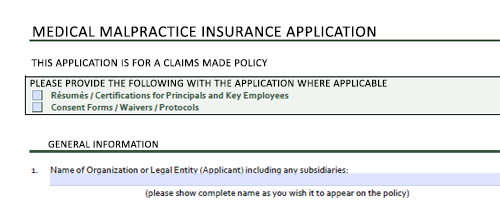As a law firm with decades of experience defending healthcare practices against litigation, as well as victims of wrongful medical injuries, we have extensive knowledge of medical malpractice insurance.
In this article, we provide information on this topic. This includes an overview on this type of insurance, who’s required to have it, and important legal aspects pertaining to malpractice insurance, particularly in the State of Florida.
Overview
Medical malpractice insurance, also known as professional liability insurance or simply “med mal insurance.”, protects medical professionals from expensive liability associated with mistakes resulting in bodily harm. This type of insurance policy may be entitled errors and omissions coverage (E &O).
Considering the fact that the medical profession deals with human lives and medical professionals may make unintended errors that negatively affect patients, this coverage becomes necessary and is often required by hiring institutions.
Laws On Medical Malpractice Insurance
Each state has laws regarding this type of insurance. Generally, doctors, dentists, anesthesiologists and other medical professionals must carry a minimum amount of insurance coverage. Since more than half of doctors are sued at one point during their careers, it’s prudent to purchase protection. In fact, a study in the New England Journal of Medicine noted that 1 in 14 doctors face a malpractice suit each year. So, state laws and financial protection dictate the need for coverage.
Med mal insurance may cover medical expenses, property damage, and lawsuit costs. When a medical professional is sued by a patient, or an institution, the legal costs may be astronomical. In fact, the average out of court settlement is just under $500,000; however, the average jury may award over $1,000,000. Since the medical profession is routinely sued adequate insurance is essential for most healthcare workers.
Florida Medical Malpractice Insurance
 Florida has certain requirements regarding the amount of medical malpractice insurance physicians must carry. Doctors must purchase up to $100,000 in malpractice coverage. Physicians working in a hospital setting are required to have $250,000 malpractice insurance. Of course, there are “loopholes” and some doctors ignore the guidelines and do not purchase insurance. This is also known as “going bare.”
Florida has certain requirements regarding the amount of medical malpractice insurance physicians must carry. Doctors must purchase up to $100,000 in malpractice coverage. Physicians working in a hospital setting are required to have $250,000 malpractice insurance. Of course, there are “loopholes” and some doctors ignore the guidelines and do not purchase insurance. This is also known as “going bare.”
Going bare is not recommended as refusing to buy malpractice insurance is like playing “Russian Roulette.” This reckless behavior is detrimental to both the patient, and healthcare practice. It’s detrimental to the patient because there won’t be much of a settlement they can collect after being injured. On the other hand, it’s detrimental to the practice because the practitioner(s) may lose their business and medical license if an injury occurs.
According to an article written by The Huffington Post, “Because uninsured doctors are undesirable defendants for most personal injury lawyers, when any Florida medical malpractice lawyer investigates a potential claim, one of the first questions asked is, “Does the doctor have malpractice insurance?” (The Huffington Post, 2013, Patients, Beware When Doctors ‘Go Bare’)
Coverage Issues
Most medical professionals understand the need for adequate liability insurance. The critical issue is to purchase the correct policy. Obviously, an obstetrician would not purchase the same coverage as a dentist. Beyond the obvious differences, insurance coverage becomes very complicated. Many times policies have annual and individual limits.
Also, it’s important to understand what the extended reporting period (tail) is on your policy. In other words, if your policy expires on December 31st and a patient files a claim in January, are you covered??? Without a “tail” on the policy you may not be protected. Due to the complex nature of insurance, an attorney should evaluate your coverage BEFORE you purchase a policy. So, consult an attorney that understands healthcare and insurance law.
Possible Exclusions in Insurance Coverage
Various Insurance policies usually contain numerous coverage exclusions. Coverage exclusions typically apply to the following:
- Sexual misconduct
- Claims related to another business you may own (nursing home) unless it’s included in the policy
- Acts committed under the influence of alcohol or drugs
- Criminal acts
- Fraud
- HIPPA violations
Malpractice Cases
The healthcare environment is filled with many joyful and painful events. There is great joy when a baby is born or a loved one survives an operation. There is also horrific sadness when we say our final goodbyes to loved ones. Every sad and tragic moment in a healthcare setting does not always lead to a medical malpractice suit. Yet, sometimes human error results in unexpected loss or injury.
When this happens, it’s important for everyone involved to document every detail, person, time, phone call, medication, meeting, etc. Medical professionals know this; many patients and their families may not be aware of the importance of accurate documentation. Of course, contact an attorney as soon as possible and KEEP QUIET. In other words, let your attorney speak for you. This advice is for healthcare professionals and injured parties. So, medical professionals and injured parties may require an experienced attorney if negligence has occurred in a healthcare setting.